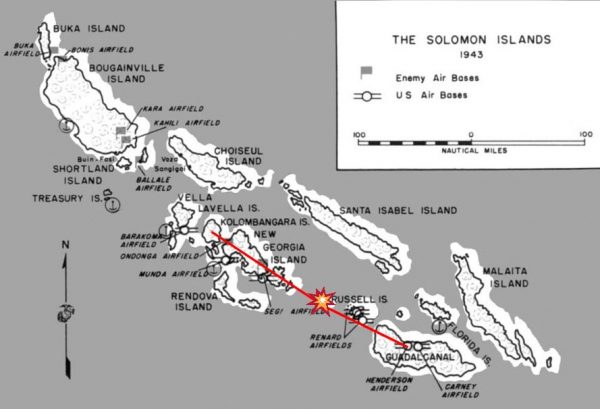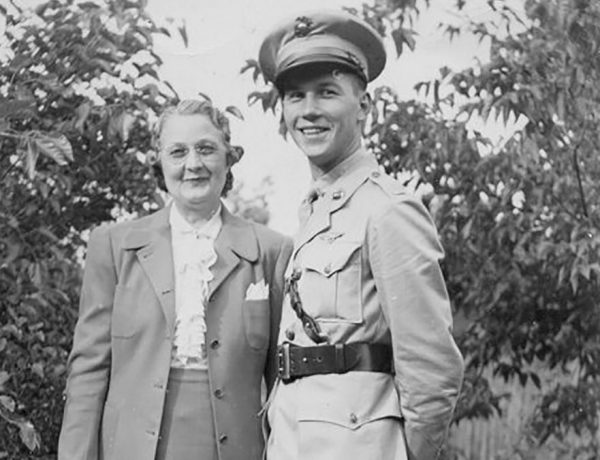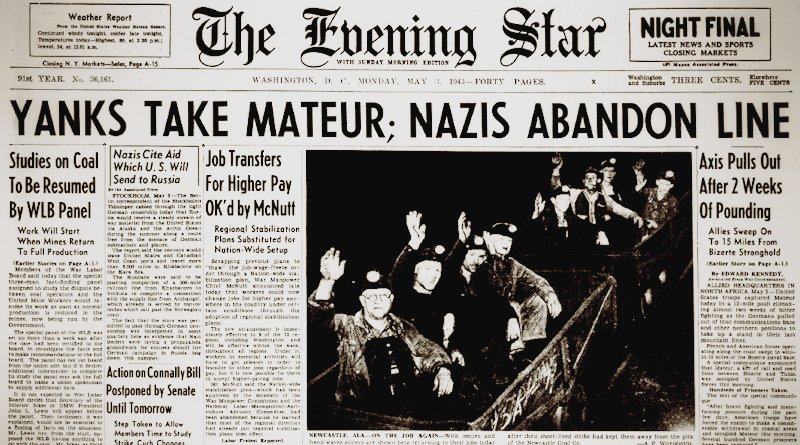World War II Chronicle: May 3, 1943
Click here for TODAY’S NEWSPAPER
On page four: four Marine Fighting Squadron 213 (VMF-213) “Hell Hawks” F4U Corsair pilots engaged a force of 30 Japanese bombers and fighter escorts that were headed for Guadalcanal. Despite five-to-one odds the Marines attacked and forced the Japanese to return.

Maj. Munford K. Peyton splashed three enemy warplanes and earned a Distinguished Flying Cross. He will also serve in the Korean War. 1st Lt. Milton N. Vedder got two but was shot down. Although wounded, he bails out and swims to safety and is cared for by coastwatchers until he is picked up by a Catalina crew. In July, Vedder becomes an ace, but he passes away in January from an illness. 1st Lt. Leland L. Eckart is also shot down and he is never found. 1st Lt. Milton E. Peck bagged one and he perishes in June when an engine failure forces him to ditch his Corsair off Guadalcanal’s Koli Point.

Speaking of Marine aviators, Capt. Joe Foss has returned to his hometown of Sioux Falls, S.D. We will have more news soon about America’s top ace. “Flying Tiger” veteran and now Marine Corps major Gregory “Pappy” Boyington’s Marine Fighting Squadron 122 (VMF-122) has just transitioned from Grumman F4F Wildcats to the Corsair. The skies over the Solomons are soon to become very deadly to Japanese…
Page nine tells the story of the crew of a B-24D named Queenie Take It Off that ran out of fuel and had to ditch after a bombing mission over Ballale Island. All the crew made it out of the broken aircraft except for the tail gunner, who was about to release the life raft just as the bomber hit the water. The men treaded water until daylight and when hope of their survival seemed to run out, the life raft floated to the surface. They were saved, but would spend the next two days fighting the current to reach San Cristobal. The article can’t name the gunner because the family may not yet have been notified, but he was Staff Sgt. Eugene F. Gartland, of Mahoning County, Ohio…
George Fielding Eliot column on page 10… Chapter 21 of “Torpedo 8” continues on page 13… Sports section begins on page 14
Roving Reporter by Ernie Pyle
NORTHERN TUNISIA — (By Cable) — As is bound to happen in wartime, our close friends sometimes disappear. And as soon as they are gone you sit of an evening and recount stories about them, just as we used to do in the old aviation days after a mail pilot didn’t come back from his run.
The closest friend I’ve got so far is Lt. Leonard Bessman, a lawyer from Milwaukee. We have almost definite proof that Bessman was captured, and not killed, so we all hope to see him again before too long if things turn out right.
I’ve mentioned Lennie Bessman before in these columns. Of all the soldiers I have ever known he is the most sensitive to the little beauties of war and to the big tragedy of life. Maybe that is because he is Jewish, or maybe it isn’t, I don’t know.
His bravery was a byword among us long before he was captured. It was a bravery based on pure idealism — the invulnerable kind of bravery — and it was inevitable that sooner or later he would either die or fall prisoner. I never heard of anyone who didn’t love and admire him.
We sit around on our cots of a night and laugh about word’s we’d heard Lennie say, because they sounded so melodramatic, yet, knowing him as we do, we know they weren’t melodramatic at all and that Lennie meant what he said.
He was up forward of our advance troops, for that was his job, and suddenly he found himself cut off, with a German tank in front of him and a machine-gun nest on his side. Lennie jumped out of his jeep, pulled his .45 and yelled at the heavily armed enemy:
“Come out and I won’t shoot,”
How’s that for confidence? We sit around at night and laugh about it.
Most of us find our emotions jaded as month after month of war piles up on us, but Lennie never was jaded. He had a facility for mirroring in his fertile mind every little human thing that crossed his path. I’ll tell you a couple of stories he told us.
We have a certain type of anti-aircraft gun, mounted on a half-track which requires two men to fire. They sit in two metal bucket seats just back of the guns.
Lennie was lying near this ack-ack outfit during a terrific dive-bombing and strafing. He kept his eyes on these two special gunners as the Stukas came right down upon them.
The two never wavered. They sat there firing until suddenly and in unison they toppled sideways out of their seats–dead. And all within the same instant two more Americans rose like twins from the bed of the half-track, took the seats just vacated by death and went right on with the fighting.
Lennie was terribly moved by that little drama of duty automatically performed, and he would almost choke up when he told the story.
The incident that most tickled his admiration was a queer one. It seems we had a big concentration of artillery that was giving the Germans plenty of trouble. They couldn’t locate it, so at night they would send planes over hunting for it. Of course it was then our cue to lie low and silent, so as not to give away our position by firing at them.
They came night after night and never did find us. But each night after they had circled and were finally leaving, one lone contemptuous shot at them, just as though to say:
“Here we are, you silly fools!”
Night after night that one lone gunner would fire his one slapstick shot just as they were leaving. His sauciness exalted Lennie’s soul. I heard him say:
“I’d rather shake hands with that man than anybody in the American Army. I’m going to try to find him, and even if he’s a private I’m going to salute him.”
We have heard that the Germans took the few Americans captured at El Guettar and marched them up the main street of Tunis, then loaded them in trucks and paraded them back again. Then unloaded them and marched them through town once more — to make it look as though there were lots of prisoners. One of Lennie’s friends back here says he can just see Lennie, on his third compulsory trip down the main street of Tunis, screwing up his nose in the special mask of comic disgust, which is one of his little habits, and observing: “Seems as if I’ve seen this before somewhere.”
Pyle’s friend Lennie — 1st Lt. Leonard B. Bessman — was awarded a Purple Heart and the Distinguished Service Cross and will escape from German captivity in Italy. Prior to entering law school, Bessman enlisted in the Marine Corps (1929-32) and he leaves the Army as a lieutenant colonel in 1947.
Evening star. (Washington, D.C.), 3 May 1943. Chronicling America: Historic American Newspapers. Lib. of Congress.
https://chroniclingamerica.loc.gov/lccn/sn83045462/1943-05-03/ed-1/
